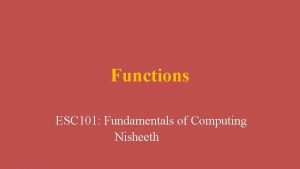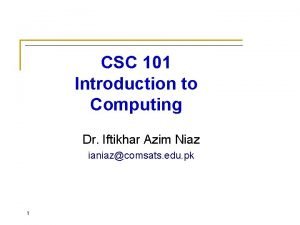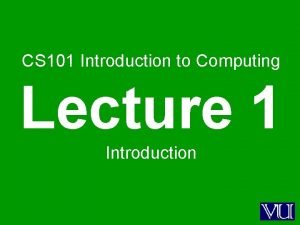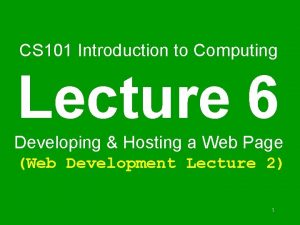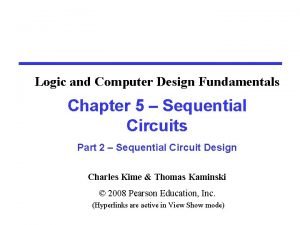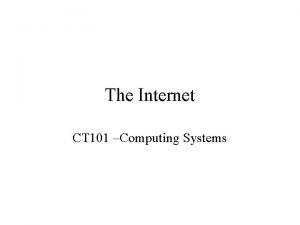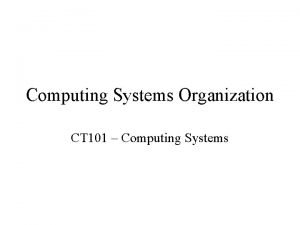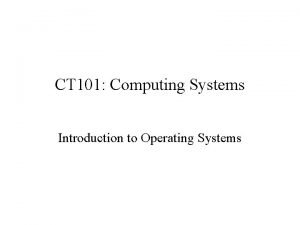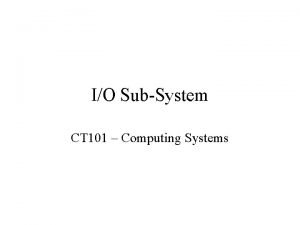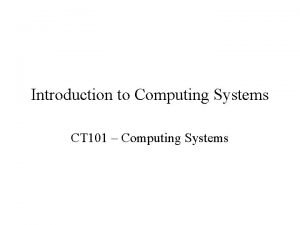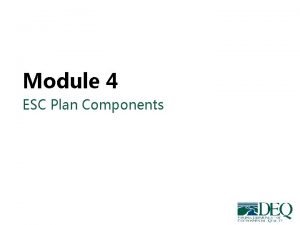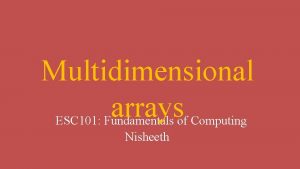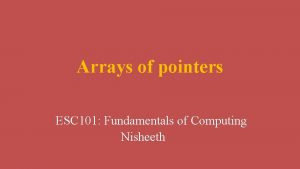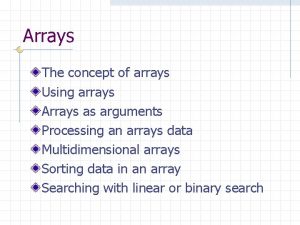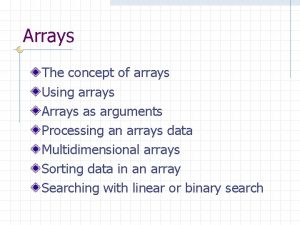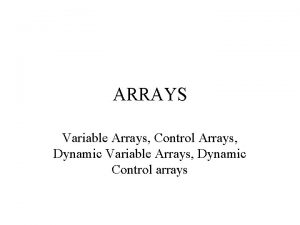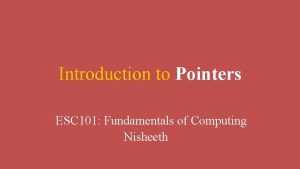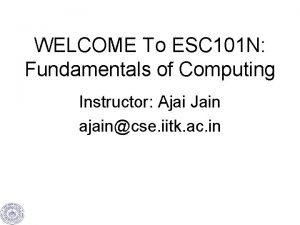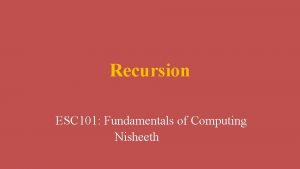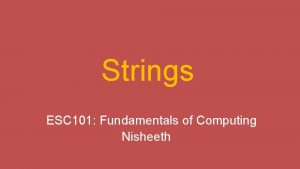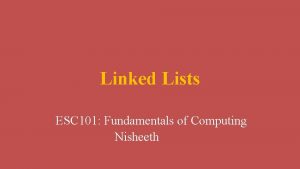Introduction to Arrays ESC 101 Fundamentals of Computing










![Array: Declaration and Initialization Can be initialized at time of declaration itself int a[6] Array: Declaration and Initialization Can be initialized at time of declaration itself int a[6]](https://slidetodoc.com/presentation_image_h2/6b47a0c1a9229ffd918548d4408a3971/image-11.jpg)
![Array: Traversal #include <stdio. h> int main() { } Initialize int array[] = {1, Array: Traversal #include <stdio. h> int main() { } Initialize int array[] = {1,](https://slidetodoc.com/presentation_image_h2/6b47a0c1a9229ffd918548d4408a3971/image-12.jpg)

- Slides: 13

Introduction to Arrays ESC 101: Fundamentals of Computing Nisheeth

Mid-sem Lab Exam: February 15 (Saturday) § Morning exam § 10: 00 AM - 12: 30 PM – starts 10: 00 AM sharp § § CC-01: A 9, {A 14 even roll numbers} CC-02: A 7, A 10, A 11 CC-03: A 12 MATH-LINUX: A 8, {A 14 odd roll numbers} § Afternoon exam § 12: 45 PM – 3: 15 PM – starts 12: 45 PM sharp § § CC-01: A 1, {A 2 even roll numbers} CC-02: A 4, A 5, A 6 CC-03: A 3 MATH-LINUX: A 13, {A 2 odd roll numbers} 2

Mid-sem Lab Exam: February 15 (Saturday) § Go see your room during this week’s lab § Be there 15 minutes before your exam time § No entry for candidates arriving later than 09: 45 for morning exam and 12: 30 pm for the afternoon exam § Cannot switch to another session (morning to afternoon or vice-versa) • Syllabus – till functions (no arrays) • Open handwritten notes – However, NO printouts, photocopies, slides, websites, mobile phone or tablet • POSSESSING ANY OF THESE WILL BE CONSIDERED CHEATING • Prutor Code. Book will be unavailable during lab exam • Exam will be like labs - marks for passing test cases • Marks for writing clean indented code, proper variable names, a few comments – illegible code = poor marks 3

How to store lots of values of same type? § We have seen many data types so far § int, float, char, etc. § We can use a variable to store a single value of some data type, e. g. , § int x = 2; // variable x stores one integer value § float x = 2. 3; // variable x stores a one float value § char x = ‘c’; // variable x stores one char value § What if we want to store several values, all of same data type? § Example 1: Marks of all ESC 101 students in Major Quiz 1 (all floats) § Example 2: Roll numbers of all ESC 101 students (all int) § Example 3: Final grade of all ESC 101 students (all char) 4

How to store lots of values of same type? § Consider storing Major Quiz 1 marks of all ESC 101 students float marks 1, marks 2, marks 3, . . , marks 500; scanf(“%f”, &marks 1); scanf(“%f”, &marks 2); . . . scanf(“%f”, &marks 500); § This is very time consuming, inelegant, and boring § Arrays provide a better and more efficient way of doing such things 5

Arrays § Not a new data type but a “data structure” (a collection of variables) § Enables storing multiple values of the same data type § Specification/declaration of an array needs the following § A data type (data type of values to be stored; all must be of same type) § A name (same naming convention as variables) § A size (how many values to be stored) § An example of array declaration: Data type float marks[500]; Name Size is an integer in square brackets 6

Arrays: Basic Syntax In some other languages (such as Python), array indexing starts with 1 § Each value within the array is called “element” of the array § Each element is accessed using a non-negative integer-valued index § First index is 0 (index of first element) § Last index is array size minus one (index of last element) is an § Syntax to access/use each element of the array Index integer in square brackets name_of_array[index] § For example: § marks[0] is the first element of an array named marks § marks[1] is the second element of array marks § marks[499] is the last element of array marks 7

Arrays: Basic Syntax § Array index needs to be within limits (0 to array size - 1) § For an array declared as marks[500] § Index -1 is invalid (may give segmentation fault, also known as “segfault”) § Index 510 is invalid (may give segfault) § Index 500 is also invalid (recall that 499 is the index of last element) § Array index need not be a constant integer, § Can also be a variable/expression (but only int) § Example: marks[i] or marks[2*i + 1] where i is an integer § Never use a float/double as index 8

Arrays: Storage in memory Array name is like street name, index is like house number § A single variable (int/float/char etc) is stored in a single box in memory int a = 2; 3. 2 2 float b = 3. 2; a b § An array is stored in several consecutive boxes in memory (number of these boxes is equal to the size of the array) float marks[500]; marks[0] marks[1] marks[2] § More on storage of arrays when we study Pointers marks[499] 9

Array elements are comma separated Array: Declaration and Initialization Can be initialized at time of declaration itself int a[6] = {3, 7, 6, 2, 1, 0}; a 3 7 6 2 1 0 Can be partly initialized as well int a[6] = {3, 7, 6}; a 3 7 6 However, if not initialized in same line with declaration, have to be initialized one by one! int a[6]; a = {3, 7, 6, 2, 1, 0}; int a[6]; a[2] = 6; 10
![Array Declaration and Initialization Can be initialized at time of declaration itself int a6 Array: Declaration and Initialization Can be initialized at time of declaration itself int a[6]](https://slidetodoc.com/presentation_image_h2/6b47a0c1a9229ffd918548d4408a3971/image-11.jpg)
Array: Declaration and Initialization Can be initialized at time of declaration itself int a[6] = {3, 7, 6, 2, 1, 0}; a 3 7 6 2 Can be partly initialized as well int a[6] = {3, 7, 6}; a 3 7 6 Over initialization may crash int a[6] =No{1, 2, 3, 4, 5, 6, 7, 8, 9}; need to specify 1 0 I will figure out how much space needed the array size during declaration Better way to initialize is the following int a[] = {1, 2, 3, 4, 5, 6, 7, 8, 9}; Warning: uninitialized arrays contain garbage, not zeros 11
![Array Traversal include stdio h int main Initialize int array 1 Array: Traversal #include <stdio. h> int main() { } Initialize int array[] = {1,](https://slidetodoc.com/presentation_image_h2/6b47a0c1a9229ffd918548d4408a3971/image-12.jpg)
Array: Traversal #include <stdio. h> int main() { } Initialize int array[] = {1, 2, 3, 4, 5}; int i, n = 5; printf(" The array elements are: n " ); for( i=0; i < n; i++) Access { printf(" array[%d] = %d n " , i, array[i] ); } return 0; * Pro-tip: Remember that first element has index 0, and nth element has index n-1 Output: array[0] = 1 array[1] = 2 array[2] = 3 array[3] = 4 array[4] = 5 12

Next Class: More on arrays. . § Other ways of initializing arrays § Example programs using arrays § Array functions 13
 Esc 101
Esc 101 It 101 - introduction to computing
It 101 - introduction to computing Cs101 lecture 1
Cs101 lecture 1 It 101 introduction to computing
It 101 introduction to computing Fundamentals of logical computing formulation
Fundamentals of logical computing formulation 101 computing network design
101 computing network design 101 computing network design
101 computing network design 101 computing
101 computing 101computing
101computing 101 computing network design
101 computing network design 101computing
101computing Conventional computing and intelligent computing
Conventional computing and intelligent computing Esc router
Esc router Esc 18
Esc 18
